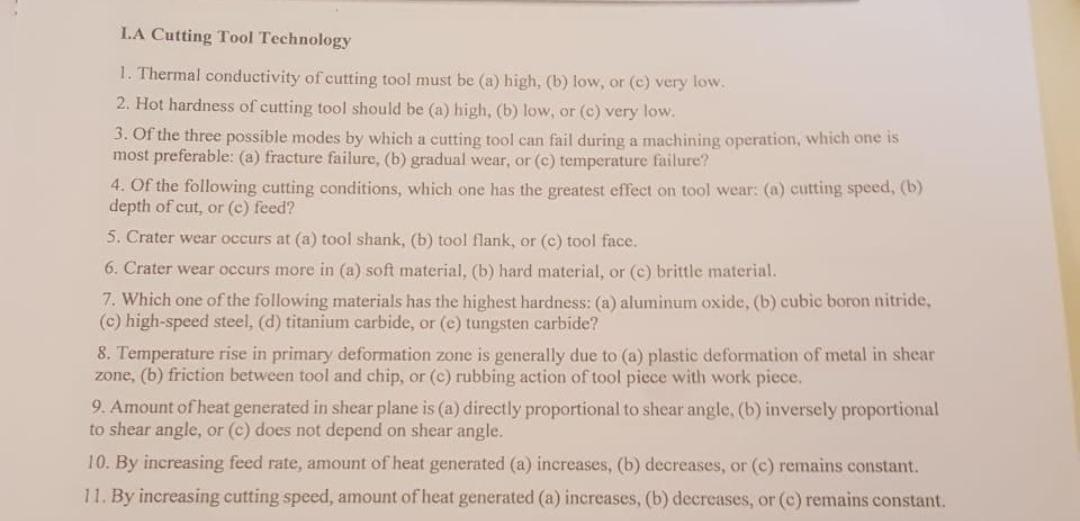Answered step by step
Verified Expert Solution
Question
1 Approved Answer
PLEASE U LA Cutting Tool Technology 1. Thermal conductivity of cutting tool must be (a) high, (b) low, or (c) very low. 2. Hot hardness
 PLEASE U
PLEASE U
LA Cutting Tool Technology 1. Thermal conductivity of cutting tool must be (a) high, (b) low, or (c) very low. 2. Hot hardness of cutting tool should be (a) high, (b) low, or (c) very low. 3. Of the three possible modes by which a cutting tool can fail during a machining operation, which one is most preferable: (a) fracture failure, (b) gradual wear, or (c) temperature failure? 4. Of the following cutting conditions, which one has the greatest effect on tool wear: (a) cutting speed, (b) depth of cut, or (e) feed? 5. Crater wear occurs at (a) tool shank, (b) tool flank, or (c) tool face. 6. Crater wear occurs more in (a) soft material, (b) hard material, or (c) brittle material. 7. Which one of the following materials has the highest hardness: (a) aluminum oxide, (b) cubic boron nitride, (c) high-speed steel, (d) titanium carbide, or (e) tungsten carbide? 8. Temperature rise in primary deformation zone is generally due to (a) plastic deformation of metal in shear zone, (b) friction between tool and chip, or (c) rubbing action of tool piece with work piece. 9. Amount of heat generated in shear plane is (a) directly proportional to shear angle, (b) inversely proportional to shear angle, or (c) does not depend on shear angle. 10. By increasing feed rate, amount of heat generated (a) increases, (b) decreases, or (c) remains constant. 11. By increasing cutting speed, amount of heat generated (a) increases, (b) decreases, or (c) remains constant.
Step by Step Solution
★★★★★
3.32 Rating (161 Votes )
There are 3 Steps involved in it
Step: 1
Answer 1 a high 2 a high 3 b gradual wear 4 a cutting speed 5 b tool flank 6 b hard material 7 e tungsten carbide 8 b friction between tool and chip 9 a directly proportional to shear angle 10 a incre...
Get Instant Access to Expert-Tailored Solutions
See step-by-step solutions with expert insights and AI powered tools for academic success
Step: 2

Step: 3

Ace Your Homework with AI
Get the answers you need in no time with our AI-driven, step-by-step assistance
Get Started


